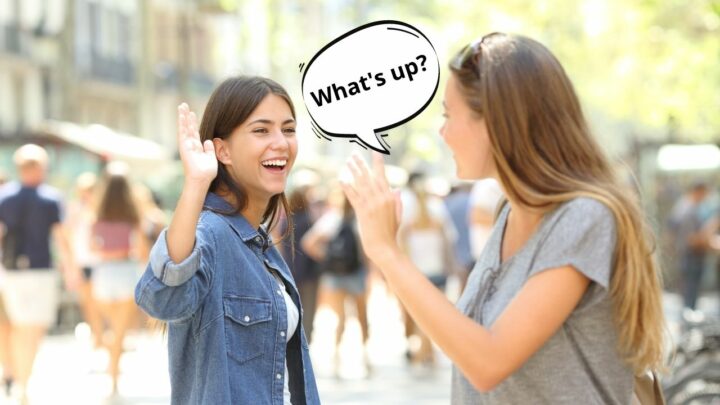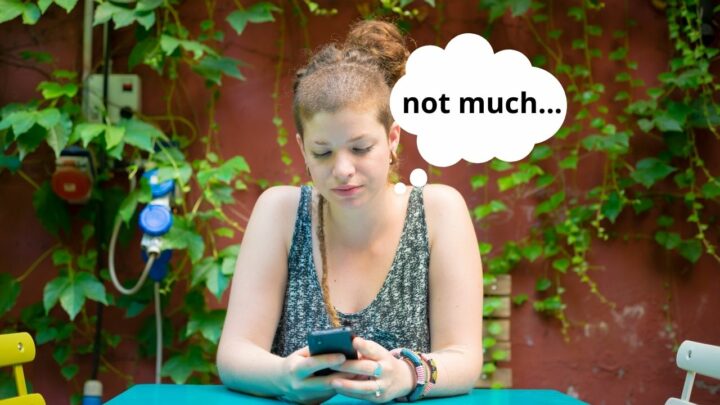You’ve simply won an e mail out of your good friend whom you haven’t noticed for relatively a while asking “What are you up to?”
How must you reply? And, what precisely does the query mean?
Would you say that you’re a bit of busy? Or, would you reply by way of announcing “not anything a lot in point of fact?”
If this is the case, how do you suppose the dialog would move in a while? All you want to do is scroll down to the ground of this web page to have a complete seize.
What does “what are you up to” mean?
The query “what are you up to” actually method “what are you doing.” However, extra frequently than now not, it both signifies that the sender of the message needs to catch up or wishes to ask a bit of want from you. It’s utilized in informal discussions between or amongst other folks with intimate relationships, as adverse to formal ones. If you’re now not busy and you’re “up to” placing out or speaking with the sender, you can say “not anything a lot” and perhaps ask a follow-up query in an instant. But when your intestine tells you now not to, then you can not directly decline by way of announcing “I’m sorry, however I’m a bit of busy at this time.”
“What are you up to?” in abundant element
People are social beings because of this we want to relate and engage with others as frequently as day by day.
This is the explanation why now we have individuals who we believe as buddies or friends whether or not in class, at paintings, or in different places.
Those other folks generally tend to faucet on us each as soon as shortly to take a look at for updates or proportion tales: the great, the unhealthy, and particularly essentially the most nonsensical ones.
If you know some as described, and but, you nonetheless stay speaking with them, then you’ve were given essentially the most authentic other folks round you, so please care for them.
This is why the query “what are you up to” issues, no less than most often talking.
Now, let’s dive a few miles deeper to perceive its meaning, serve as, and utilization in English.
The context through which to use “What are you up to?”
As discussed, if you obtain this expression by way of any direct messaging app, or pay attention it when any person calls, that individual is just asking whether or not you’re busy or now not.
Due to this fact, it may also be translated into “what’s holding you busy nowadays” or just “what are you doing at this time.”
Your interpretation is context-dependent, which is why this expression is now not that appropriate in formalistic eventualities on account of its ambiguity.
So, because the message receiver, you can use your social acuity to interpret the underlying implication of the message.
This signifies that if the sender of the message is any person you believe as a “excellent” good friend, then it normally simply method the way in which it’s.
However, if you get this from any person who isn’t that shut to your middle or from a gross sales agent, I’d perceive if you’re going to say you’re “relatively busy.”
And, now let’s speak about the serve as or function of this expression.
The Serve as of “What are you up to?”
What function does the usage of this query in conversations serve? Is it in point of fact simply to ask if any person was once busy? Or does it transcend that?
Neatly, the solution to this may handiest be appropriately interpreted throughout the language person’s psychological framework.
Now and again, it may be used as an blameless statement to get any person to point out the situation they are in, equivalent to whether or not they are busy or now not.
However different instances, it may also be used as a precursory query to an upcoming want or request.
In fact, being ready to know the actual intent relies at the general context concerned, specifically the connection with the sender.
So, once more, our herbal wit would allow us to resolve what the actual message is, so long as we are willing sufficient on the time of supply.
The Degree of Formality of “What are you up to?”
At the start of this publish, it was once discussed that your good friend despatched you an e mail asking “what are you up to.”
Would that recommend that you can additionally ship this sort of e mail message to your superiors, shoppers, and professors on every occasion you need?
Neatly, you can freely do this, in fact. However it seems that, you must now not be expecting any reaction from them, except they in point of fact are that pleasant.
This is as a result of “what are you up to” is a casual expression this is intended to be used between or amongst intimately-related folks.
So, this might come throughout as awkward or perhaps a bit offensive when used as discussed, a phenomenon known as “check in conflict.”
Sign in conflict is handiest efficient when and if the purpose is to inject humor all through conversations, and therefore, the essential warning.
Diversifications of “What are you up to?”

And now, let’s move over some diversifications of this expression that you can simply use in colloquial or casual English.
Until you’re speaking with any person in detail shut, the next words are now not acceptable within the formal surroundings equivalent to in trade correspondence.
Whatcha up to?
You’ll have heard of “whatcha up to” in motion pictures or different kinds of herbal dialog amongst local audio system of English.
This expression is a great way to get started a dialog along with your good friend that you need to catch up with.
As an example, you can name your good friend proper after his or her place of business hours and ask this query.
A: Hi, Sam! Whatcha up to?
B: I simply were given out of the place of business. I’m ravenous. Wanna grasp some dinner?
As you can apply, the direct interplay between the interlocutors means that they are moderately shut to each and every different fairly than simply acquaintances.
Whatup lately?
In a similar way, we will be able to additionally use “whatup lately” if we would like to make some plans for actions with a pal throughout the day.
A shopper or trade acquaintance might not be very inspired when you say this to them, however a bored good friend will.
A: Good day, Sarah! Whatup lately?
B: Not anything at the checklist in point of fact. Were given any plans?
Within the instance reaction above, the query reaction is suggestive of the openness to devote to an process.
What’s up?
Finally, we will be able to additionally make use of “what’s up,” which is most certainly the most-popularly used word on account of its briefness and straightforwardness.
“What’s up” may also be very easily used when you stumble upon a pal abruptly in the similar venue.
Or, it may be used as the most simple greeting upon arriving at a birthday celebration or accumulating.
The message receiver isn’t essentially obliged to resolution the query at period, because it will also be used instead for “hi” or “hello.”
A: Good day! Calvin, Walter, Paul, what’s up?
B: Nah. Simply placing out. Cross grasp your self a lager.
And now, let’s check out to take a look at different differently-phrased expressions that mean the similar as “what are you up to.”
Different ways to say or synonyms of “What are you up to?”
In English, there isn’t just one prescriptive method to construction how we categorical our greetings, similar to maximum languages.
The following couple of examples are connected to “what are you up to” within the sense that they are able to be used as preliminary greeting strains both in spoken or written conversations.
How’s the entirety going?

“How’s the entirety going” is rather less direct than “what are you up to.”
The previous normally activates a shorter reaction, in all probability with a good, impartial, or detrimental connotation equivalent to “fantastic,” “now not unhealthy,” or “horrible.”
A: How’s the entirety going?
B: Issues are nice. Thank you.
The temper of the message receiver may also give some indicators whether or not she or he needs to stay the dialog going.
If this is the case, a follow-up query shall be heard, in addition to an creation of a subject matter to discuss.
What are you doing?

A easier synonym for “what are you up to” is “what are you doing,” which has a miles clearer meaning.
If an individual asks this query, she or he merely needs to know what process you are engaged in on the time of asking the query.
A: Hi, Fiona. What are you doing?
B: I’m looking ahead to the laundry to get completed. And you?
Then again, this query will also be used rhetorically by which the person isn’t in point of fact requesting the process, however fairly needs to rebuke or reprimand any person doing one thing incorrect or awkward.
This may occur, for example, when your sibling hugs you for no reason why.
A: ( hugs B)
B: Eeww! What are you doing? Get off me!
Are you busy at this time?

In spite of everything, essentially the most fair identical to “what are you up to” is in all probability “are you busy at this time.”
Essentially the most sensible implication of the expression being mentioned is to know whether or not the supposed receiver is to be had for a talk, and that’s it.
Clearly sufficient, we will be able to interpret it then again we would like.
However, if we don’t need to get wired about it, we will be able to all the time return to this meaning as a default procedure.
A: Billy, are you busy at this time?
B: In reality, I’m riding. Can I name you later? A: Yeah, k. Communicate to you later.
How to reply to “What are you up to?”

Even though the fundamental meaning of “what are you up to” is “what are you doing,” you can’t simply reply by way of declaring no matter motion you’re doing on the actual second you obtain the message.
That implies you can’t simply say “I’m status,” “I’m sitting, or “I’m consuming.” However, “I’m riding” is an exception in fact.
I mean, sure, you might say the ones issues, however simply be mindful that such literal responses are sarcastic, which is relatively impolite fairly than funny when completed out of context.
And, rudeness might lead to aggression, so this merely isn’t the best more or less reaction to give in maximum eventualities.
If you suppose you’re busy and you can’t communicate, or in all probability you simply don’t need to communicate, then merely say “I’m somewhat busy nowadays” to kill the dialog.
However, if you’re occupied with having a discourse, then you can open up the dialogue by way of announcing “now not a lot” after which asking a follow-up query.
Once more, the reaction is basically in keeping with the context, fairly than any standardized language laws.
“What have you been up to?” vs. “What are you up to?”
Every other query that this publish needs to cope with is expounded to the grammatical distinction between “what have you been up to” and “what are you up to.”
The principle distinction lies within the tenses used, through which the primary is within the provide best, and the second one is within the easy provide disturbing.
The timeline of the current best may also be simplified into the meaning of “from earlier than till now,” while the straightforward provide into “all the time.”
Then again, the primary query is extra context-dependent fairly than the second one construction.
If any person asks you the usage of the existing best disturbing, the individual is occupied with listening to your lifestyles occasions within the moderately fresh previous.
A: Is that you, Brandon?! It’s been perpetually, guy. What have you been up to this present day?
B: I simply were given married closing yr, and we’re having a toddler quickly.
The time being referred to may mean “lately,” “this present day,” “those previous few weeks,” or “those previous few months,” relying at the closing time you’ve interacted with the speaker.
While, the query “what are you up to” suggests extra of an inquiry to the receiver’s plan of actions “nowadays,” “inside the similar day,” and even “a few days later.”
A: Good day, George! I think more or less bored. What are you up to?
B: Not anything a lot, too. Come over right here. Let’s play ping-pong.
Put merely, the previous query merely targets to steered a common replace, however the second one expression’s function is to inquire whether or not one is to be had on the time of talking.
Steadily Requested Questions about “What are You Up To?”
How are we able to resolution “what are you up to?”
We will merely resolution it by way of declaring the process we are doing on the time of asking the query like “I’m riding.” Or, we will be able to even reply with our location “I’m simply at house,” which signifies that one isn’t busy and is to be had for an process.
What does “what are you up to lately” mean?
“What are you up to lately” method “what are your plans lately.” Thus, it’s frequently interpreted as an implicit invitation to do one thing for the day.
Must or not it’s “what are you up ‘to’ or ‘too’?”
“Too” is an adverb and “to” is a preposition. The query calls for a preposition, fairly than an adverb, to whole the phrasal verb “to be up to” because of this “to be doing” one thing.
Conclusion
We use language to point out significant utterances, steered the hearer to do one thing, or create a undeniable impact at the message receiver.
The query “what are you up to” may also be interpreted in numerous tactics relying at the context of the dialog.
With those, we will be able to, due to this fact, deduce {that a} remark isn’t all the time as blameless as it kind of feels, thereby highlighting the function of pragmatics in language use.

Good day fellow !! It’s me, James. I’m the proud proprietor of uggscanadaugg.ca. Languages have all the time been my hobby and I’ve studied Linguistics, Computational Linguistics and Sinology on the College of USA. It’s my utmost excitement to proportion with all of you guys what I learn about languages and linguistics normally.


